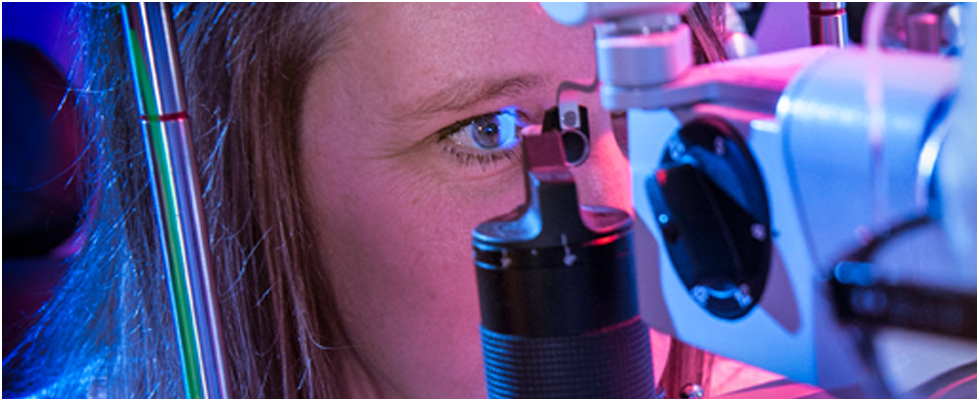There have been considerable advances in the treatment of certain types of macular degeneration (AMD). We also know that we can be the most helpful if macular degeneration is diagnosed early. However, patients must understand that once the macula has been damaged, there is no treatment that currently can reverse that damage and the associated loss of vision. Early diagnosis and treatment to prevent or halt vision loss must be the approach that we take.
Macular Laser Photocoagulation
A number of years ago, a distinguished group of eye surgeons and macular disease specialists formed The Macular Photocoagulation Study Group in order to conduct well controlled international clinical studies to determine what particular macular conditions should be treated with lasers, what types of lasers should be used, which patients might get the best results and to try and establish the best ways to use lasers to treat macular degeneration. Our eye doctors and retinal specialist routinely review results from studies such as The Macular Photocoagulation Study and have used a set of useful clinical guidelines derived from this study for the Laser Treatment of Macular Degeneration:
- Laser Treatment of the Macula is ONLY useful for the EARLIEST stages of Wet Macular Degeneration. There is NO application for Dry Macular Degeneration.
- Laser treatment of Macular Degeneration is ONLY applicable if the growth of new blood vessels or neovascularization is outside the center of the Macula-called the Fovea.
- Very few areas of neovascularization are defined well enough be treated effectively. We can ONLY treat those areas where the definition of the neovascularization is clearly outlined.
- In cases where laser treatment was successful, leakage returned in 50% of cases by 2 years.
Thus, the overall guidelines for Laser Photocoagulation for Macular Degeneration suggest that it is limited in its effectiveness and may also lead to scarring of the macula and additional vision loss. Thus we tend to emphasize the use of therapeutic injections of Vascular Endothelial Growth Factor Inhibitors (VEGF) to treat macular degeneration.
Vascular Endothelial Growth Factor (VEGF) Inhibitors Eylea® and Lucentis® Injections
Resulting from basic research in cancer therapy in the area of “angiogenesis”, or new blood vessel growth, a large knowledge base has been developed in the treatment of Wet Macular Degeneration. Researchers discovered that a specific protein called “Vascular Endothelial Growth Factor” (VEGF) causes the growth of new blood vessels or “neovascularization” to occur in the eye. The intravitreal injections of Eylea® or Lucentis® are very effective in stopping and reversing the neovascularization that can lead to catastrophic vision loss from Wet macular degeneration. The injections of VEGF inhibitors such as Eylea® and Lucentis® are performed by prescription only and injected only by our Retina Specialist.
Should you have, or be at risk for, Wet Macular Degeneration, we will discuss more about the testing and treatment results with you. Our retina Specialist will also be able to tell you more about the length of your actual treatment program, as it varies for each patient. If Eylea® Injection or Lucentis® Injection is a possible option, we will spend the time necessary to thoroughly review the possible risks, benefits and side effects with you before you decide to proceed.
Diet Considerations, Vitamins & Supplements for Age Related Macular Degeneration
There are a number of studies that have strongly suggested that nutrition may play a role in the likelihood of developing macular degeneration. It appears that people who have a diet that is rich in fruits and vegetables, particularly green leafy vegetables, have a considerably lower incidence of macular degeneration.
It is not yet clear whether taking dietary supplements can prevent progression in patients with existing macular disease, but it does seem clear that certain dietary supplements can reduce your risk of macular degeneration. The Age Related Eye Disease Study (AREDS), which was sponsored by the National Eye Institute, showed that taking high levels of antioxidants and Zinc could reduce the risk of developing Age Related Macular Degeneration by about 25%. This is not a cure, but we need to consider this is one of the possible ways to help patients who are at risk prevent vision loss from age related macular degeneration (AMD).
A VERY SPECIFIC FORMULATION WAS USED IN THIS STUDY
BEFORE patients begin taking any course of vitamin or antioxidant supplements, you should fully discuss the risks and benefits with our Retina Specialist, who will determine in consultation with your family physician or Internist if necessary, whether this is safe and effective for you.
With early diagnosis it is possible to have a number of treatment options available to help preserve your vision. The Baltimore Washington Eye Center Retina Specialist has the experience and expertise to provide treatment options for macular degeneration including injections of Eylea® and Lucentis® and will take the time necessary to answer your questions and help you get the best possible results. Please schedule an appointment by calling Baltimore Washington Eye Center at 800-495-3937.


